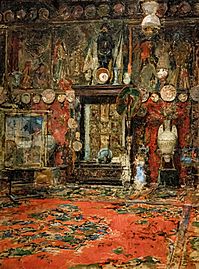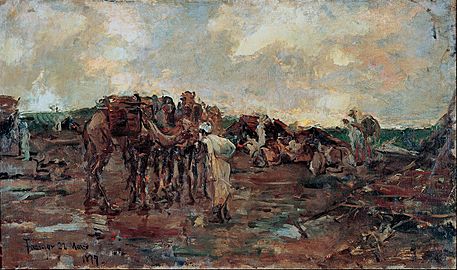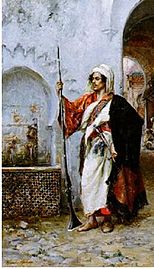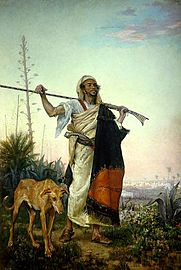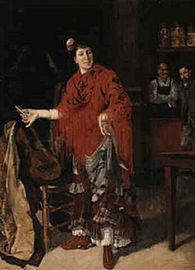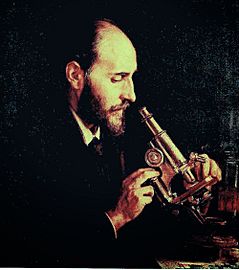Ricardo de Madrazo facts for kids
Quick facts for kids
Ricardo de Madrazo
|
|
|---|---|
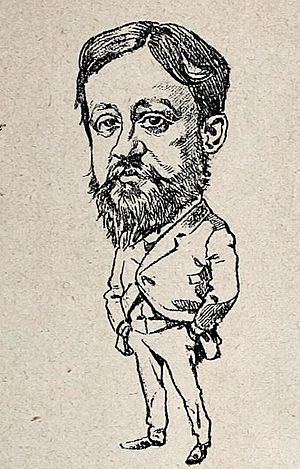
Portrait by Ramón Cilla (1894)
|
|
| Born |
Ricardo Federico de Madrazo y Garreta
7 February 1852 Madrid, Spain
|
| Died | August 18, 1917 (aged 65) Madrid
|
| Nationality | Spanish |
| Education | Real Academia de Bellas Artes de San Fernando; Accademia Chigi, Rome |
| Known for | Painter |
| Movement | Orientalist |
Ricardo Federico de Madrazo y Garreta (born February 7, 1852 – died August 18, 1917) was a Spanish painter. He came from the famous Madrazo family of artists. Ricardo was best known for his paintings that showed scenes from the Middle East and North Africa, a style called Orientalist art.
He was also the brother-in-law of Mariano Fortuny, another great Spanish Orientalist painter. Fortuny had a big impact on Ricardo's life and his art.
Ricardo's Life Story
Ricardo Federico de Madrazo y Garretta was born in Madrid, Spain. His family was full of artists and had a noble background. His grandfather, José de Madrazo, was a painter and used to be the Director of the Prado Museum. His father, Federico de Madrazo, was also a painter.
His uncles were also artists: Luis de Madrazo was a painter, Pedro de Madrazo was an art critic, and Juan de Madrazo was an architect. His brother, Raimundo de Madrazo y Garreta, was a painter too. Even his mother's father, Tadeusz Kuntze, was a Polish painter! The Madrazo family was one of the most important painting families in Spain during the 1800s.
Ricardo and his brother Raimundo first learned art from their father. Later, Ricardo went to the Real Academia de Bellas Artes de San Fernando for formal studies. There, he learned from painters like Joaquim Espalter and sculptors like Ricardo Bellver.
In 1866, Ricardo became good friends with Marià Fortuny. Fortuny greatly influenced Ricardo's art and life. The next year, Fortuny married Ricardo's sister, Cecilia de Madrazo. Ricardo traveled with the Fortuny family to Toledo. Then he went with Fortuny to Rome, Italy, where he studied at the Accademia Chiggi. Later, Ricardo and his brother Raimundo worked in Fortuny's art studio.
Ricardo went with Fortuny and his family again when they moved to Paris, France. While there, he spent his time copying famous artworks at the Louvre and the Musée du Luxembourg museums.
During the Franco-Prussian War, Ricardo and Raimundo went back to Spain. They settled in Granada. Later, Ricardo traveled to Morocco with Fortuny and Josep Tapiró. After that, he returned to Rome. He traveled to Morocco again after Fortuny sadly passed away in 1874.
After Fortuny's death, Ricardo took care of his studio. He made a list of all Fortuny's artworks and helped arrange an auction for them in Paris. Meanwhile, Ricardo's sister, Cecilia, spent the rest of her life making sure her husband's memory lived on.
After Fortuny's death, Ricardo moved between Paris, Madrid, and Tangiers. He lived in Venice for a short time. In 1884, he got married. He finally settled in Madrid in 1885. From Madrid, he made yearly trips to Paris and Venice. Once he was settled in Madrid, he started to focus on painting portraits. Painting portraits was a special skill of the Madrazo family.
Many important people visited his studio. These included Queen Maria Christina, the kind person Archer Milton Huntington, the French art collector Paul Durand-Ruel, and President William Taft. Ricardo knew a lot about old art, so many people asked him for advice.
What He Painted
Ricardo de Madrazo was famous for his Orientalist paintings. These artworks showed scenes, people, and places from North Africa and the Middle East. He also became well-known for his portraits.
Some of his most famous paintings include:
- Marroquíes (Moroccans)
- Turistas y Mendigos (Tourists and Beggars)
- Un Mercado de Fez (A Market in Fez)
- Alto en una Caravana árabe (Stop for an Arab Caravan)
- Atelier de Fortuny (Marià Fortuny's Studio in Rome), painted in 1874
- Resto de la Caravana Árabe (Rest for an Arab Caravan), painted in 1880
- Un Árabe de Sud (A Moor from the South), painted in 1881
Selected Paintings
-
Portrait of Santiago Ramón y Cajal, 1910
Images for kids
See also
 In Spanish: Ricardo Madrazo para niños
In Spanish: Ricardo Madrazo para niños
- List of Orientalist artists
- Orientalism
 | Selma Burke |
 | Pauline Powell Burns |
 | Frederick J. Brown |
 | Robert Blackburn |


